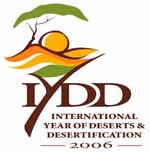About the project
Gives information on background, structure, components, initiatives, funding, partners etc for the Iullemeden Aquifer Project
The Aquifer System of Iullemeden is shared by Mali, Niger and Nigeria. It covers an area of 525000 km². The management of this Aquifer should belong within the overall sustainable development process that Mali, Niger and Nigeria have formulated in their respective Poverty Reduction Strategic Paper (PRSP). This framework paper combines the sector-based policies and strategies within a long term prospective vision. It represents a consistent referential which governs the relations of the States with their technical and financial partners.
Besides, these three countries adopted the "Ouagadougou Declaration" (1998) under which the West-African countries resolvedly pledge to upgrade their water resources management modes from a sector-based and technocratic approach into a comprehensive and participatory approach of integrated management, and this in compliance with the principles adopted by the Prep-Com of Dublin in January 1992 and ratified by the United Nations Conference on the Environment and Development (UNCED) held in Rio in June 1992 (recommendations of chapter 18 of Agenda 21 relating to fresh water resources).
Mali, Niger and Nigeria also adopted Resolution XII-8 of the UNESCO International Hydrological Program (PHI-V), relating to the study of the fossil aquifers in sub-Saharan Africa, with a view to remedying the rainfall deficits. They also adopted the African Water Vision for 2025, the NEPAD initiative, and the Action Plan of the Johannesburg World Summit for Sustainable Development for purposes of achieving the MDGs (Millennium Development Goals).
Lastly, these three countries concur on the need to improve knowledge about their water resources in view of meeting the water needs of their respective populations, both in terms of quantity and quality. A common and concerted management of this shared resource proves to be a sine qua non condition allowing the three countries to integrate this resource as a significant potential enabling them to achieve their development goals.
Drawing upon its 2010 strategy which is closely connected with the implementation of the UN environmental conventions (Convention to Combat Climate Change, Convention on Biological Diversity and Convention to Combat Desertification), with the concerted management of shared aquifers and relevant African initiatives for a sustainable development of Africa (NEPAD, Johannesburg Action Plan, . . . ), the OSS listed the concerted management of shared water resources as a key component of its water program and gathered a recognized expertise in this field. A methodological approach in matter of Integrated and Concerted Management of the water resources of shared aquifers thus serves as reference in the field. The new orientation of the IAS project is largely inspired by this basin approach as it seeks to accompany Mali, Niger and Nigeria so that they would manage in a concerted and sustainable way the Iullemeden basin which is considered among the largest basins of Africa.






 IW:LEARN.net
IW:LEARN.net